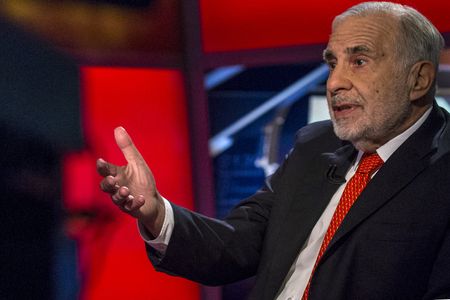 1
1 1
1
By Manya Saini, Niket Nishant and Koh Gui Qing
(Reuters) -Hindenburg Research, the short investor whose reports on companies have erased a big chunk of their value, criticized Icahn Enterprises LP (IEP) on Tuesday over the reporting of its finances, leading to a 20% drop in the shares of activist investor Carl Icahn’s firm.
The development represents a rare challenge for Icahn who is accustomed, as one of the pioneers of shareholder activism, to dressing down companies over their governance and transparency, but has not had to field such criticism himself.
In a report published on Tuesday, Hindenburg accused IEP of overvaluing its holdings and relying on a “Ponzi-like” structure to pay dividends. The subsequent plunge in IEP shares wiped $2.9 billion off Icahn’s net worth, leaving him with an estimated $14.7 billion, according to Forbes.
Icahn said in an IEP statement that Hindenburg’s “self-serving” report was aimed at generating profits at the expense of IEP’s long-term shareholders.
“We stand by our public disclosures and we believe that IEP’s performance will speak for itself over the long term as it always has,” Icahn said.
Icahn’s Sunny Isles Beach, Florida-based company hold his various investments in the energy, automotive, food packaging, real estate and other industries. He is IEP’s controlling shareholder with an 85% stake.
Hindenburg said IEP’s units are overvalued by more than 75% and that “IEP trades at a 218% premium to its last reported net asset value (NAV), vastly higher than all comparables.”
IEP’s peers on the other hand, such as Dan Loeb’s Third Point Investors Ltd and Bill Ackman’s Pershing Square Holdings Ltd, trade at a discount to their respective NAVs, Hindenburg said. NAV is a key gauge of a fund’s performance, measuring the market value of securities held by the fund.
Driving the frothiness in IEP’s stock, Hindenburg argued, is its dividend yield of 15.8%, the highest of any U.S. large cap company by far. Hindenburg accused Icahn of inflating the dividend yield by receiving his own dividend in stock rather than cash and making IEP sell new stock so it can meet the shareholder payouts.
“Icahn has been using money taken in from new investors to pay out dividends to old investors,” said Hindenburg.
Hindenburg also offered examples it said showed IEP itself was valuing its holdings way above their market value. IEP recorded its 90% stake in meat-packaging business Viskase Companies Inc at $243 million at year-end when its market value at the time, based on how its shares were trading, was just $89 million, Hindenburg said, citing IEP’s filings.
Viskase’s shares trade as a pink-sheet. In a filing, IEP attributed the valuation mark-up to “market comparables due to lack of material trading volume.”
In another instance, IEP marked its automotive parts division at $381 million in December 2022, one month before a key subsidiary of that division filed for bankruptcy a month later.
A representative for Grant Thornton LLP, which has served as IEP’s auditor since 2004, declined to comment.
Hindenburg also took aim at the close relationship between investment bank Jefferies Inc and Icahn. The short seller noted that Jefferies, the only major brokerage to cover IEP, assumes in its equity research that Icahn’s dividends will be paid in perpetuity even in a worst-case scenario, while at the same time profiting from arranging IEP’s stock sales.
Jefferies did not immediately respond to a request for comment.
STRING OF BIG TARGETS
IEP is the latest high-profile target of Hindenburg, which is run by Nathan Anderson and earlier this year went after India’s Adani Group, knocking more than $100 billion in value off the conglomerate’s shares. Last month, the short-seller took aim at Jack Dorsey-led Block Inc. Its previous targets have included electric car maker Nikola Corp.
Icahn, 87, has pressed for changes at a number of companies over the years including Southwest Gas Holdings Inc and Xerox Holdings Corp. In August, fast-food giant McDonald’s Corp amended its board and replaced a director targeted by Icahn.
Most recently, Icahn has been involved in a proxy fight with Illumina Inc to push the U.S. life sciences firm to unwind its 2021 buyout of Grail.
(Reporting by Manya Saini and Niket Nishant in Bengaluru; additional reporting by Svea Herbst Bayliss in New York; Editing by Savio D’Souza, Shinjini Ganguli, David Gaffen and Richard Chang)